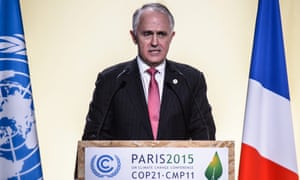Extract from The Guardian
Five nations announce they will not use emission
reduction credits they are entitled to, and on which Australia relies
to meet its 2020 targets.
Malcolm Turnbull delivering a speech about
Australia’s emissions achievements at the heads of states’
statements ceremony of the COP21 world climate change conference in
Paris. Photograph: Christophe Petit Tesson/EPA
Lenore
Taylor in Paris
Saturday 5 December 2015 19.33 AEDT
Five big developed countries have voluntarily
cancelled emission reduction “credits” achieved by overshooting
their first Kyoto Protocol greenhouse targets – the same kind of
credits Australia is banking to boast it has already “met and
beaten” its international pledges.
Germany, Denmark, the Netherlands, Sweden and
Britain have announced they will cancel 634.6m tonnes of emission
reduction credits they were technically able to count towards their
targets for the second Kyoto period, in a bid to overcome what has
been described as a giant “hot air” loophole.
Australia, in stark contrast, is
banking 128m tonnes of carryover from overshooting its lenient
target in the first Kyoto commitment period and using it to be able
to claim – as the prime minister, Malcolm Turnbull, did in his
speech to the Paris summit – that it is already on track to meet
its second pledge.
“By cancelling surplus units we hope to send a
strong positive signal of support for an ambitious global climate
agreement here in Paris,” the European nations said in a joint
statement.
Deputy chief executive of the Climate Institute
Erwin Jackson said the European countries were demonstrating a
commitment to actually reduce emissions by cancelling the same kind
of credits on which Australia is counting.
“The Australian government has previously
committed to do the same. Our current 2020 target is woefully
inadequate. Strengthening our 2020 target though cancelling leftover
emissions credits would close the gap between what we currently have
on the table and what other leading nations doing,” Jackson said.
In the lead-up to the United Nations meeting,
Australia’s environment minister, Greg Hunt, announced
that Australia had already met its 2020 greenhouse emissions
reduction target in large part due to overshooting its first
lenient Kyoto target in 2012. (Unlike most developed countries,
Australia was allowed to increase its emissions by 8% by that date,
an achievement it knew it had already when it signed on to the pledge
because it also secured special rules to allow it to count a
reduction in land clearing that had already happened.)
Most forecasts show Australia’s actual emissions
will rise by 2020. The latest analysis by the research firm RepuTex
shows they will rise 4% by 2020 compared with 2000 levels, and 6%
compared with today. The government has not yet released its updated
actual emission projections.
Hunt
described the idea that the government should consider actual
emissions rather than achieving a target via accounting rules as
“one of the oddest and strangest and I’ve got to say ...
desperate arguments” he had heard, and pointed out that the
accounting rules had been accepted internationally and by successive
Australian governments.
Asked again in Paris when Australia’s actual
emissions would start falling he said “what matters for Australia
is that we achieve our targets”.
In the Paris announcement, Germany has also
promised to cancel any surplus it achieves in the second commitment
period – out to 2020 – and not count it against the longer term
targets being pledged in Paris.
The Australian government has promised a
longer-term climate pledge of reducing emissions by 26% to 28% by
2030.
Hunt said that overshooting the 2020 target might
once again allow Australia to use the accounting rules to “carry
over” reductions to help meet the 2030 target.
“The rules haven’t been set, so of course that
is an option which Australia would consider,” he said last month.
A spokesman for Hunt said Australia would not be
forfeiting its carryover.

No comments:
Post a Comment